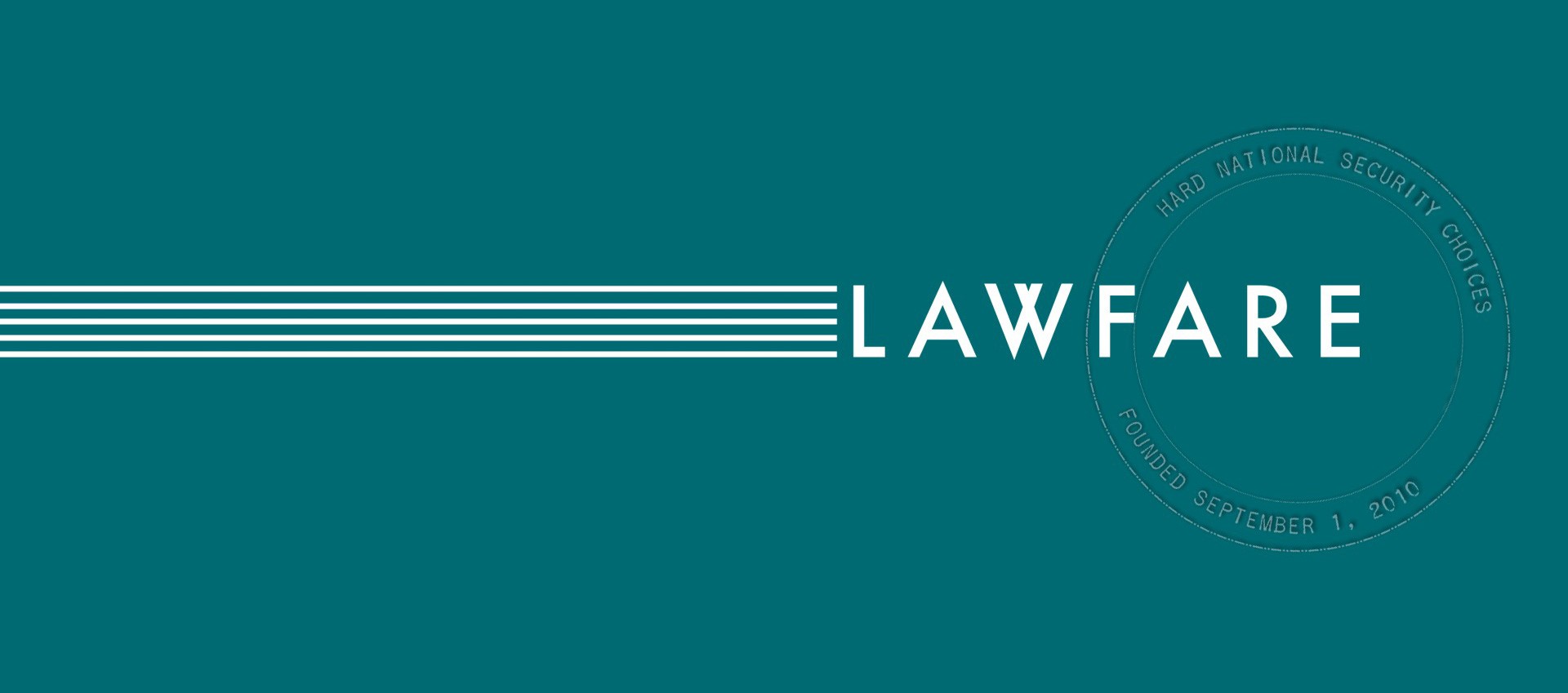Today on Lawfare
The latest on Lawfare, Sept. 3o, 2022.

Published by The Lawfare Institute
in Cooperation With

Subscribe to receive this newsletter directly to your inbox.
Articles
The Search for Accountability: A Guide to Lawfare’s Jan. 6 Project
Hadley Baker, Matt Gluck, Hyemin Han, Quinta Jurecic, Natalie K. Orpett, Benjamin Pollard, Katherine Pompilio, and Tia Sewell presented a guide to Lawfare’s coverage of the aftermath of the Jan. 6 attack on the U.S. Capitol, telling its story as we currently know it in the process.
The slate of hearings convened by the Jan. 6 Committee was the television event of summer 2022: a dramatic series that vividly reminded viewers of the chaos and violence of the attack on the Capitol. This fall, the committee faces the task of wrapping up its public hearings and compiling its work into a final report before the end of the 117th Congress. Along with the Justice Department’s criminal investigation into the insurrection, the committee’s work has received blockbuster media coverage as it continues to uncover new information about the attack.
But, the investigations by the committee and the Justice Department are far from the only efforts to hold to account those who bear responsibility for the insurrection. There’s been an impeachment, multiple separate congressional investigations, and a swarm of civil lawsuits.
These many different threads can be difficult to untangle. That’s why we’re providing a detailed overview of Lawfare’s coverage of the various ways in which the government, individuals, and entities have responded to Jan. 6. We’ve been writing and podcasting about the insurrection since the day it happened and have closely followed the twists and turns as the story of Jan. 6 continues to unfold. Here, you can refresh your memory on aspects of the insurrection and the investigations into it that you may have forgotten.
I Am Not a Source; Reading My Twitter Feed Is Not a Method
Benjamin Wittes provided an update about his ongoing lawsuit against the Department of Homeland Security over its filing of two open source intelligence reports about him in 2020.
Is the Department of Homeland Security (DHS) still filing intelligence reports about journalists?
It seems like a simple question. And I confess I wasn’t expecting the routine status report a federal judge ordered the government to file on Wednesday to raise my eyebrows—much less to warrant an article. But asked to address this apparently easy question, the Justice Department said—in essence—that it’s not sure and will get back to the judge in a few weeks. “Defendant needs additional time to appropriately address the question. ... Defendant’s response could potentially have a wide implication beyond this particular case.”
I don’t have any idea what it means either.
Paul Rosenzweig and Wittes argued that in the event the Democrats retain control of the House and the Jan. 6 committee’s work is reauthorized, Speaker Nancy Pelosi should appoint Rep. Liz Cheney to serve as chief investigative counsel for the committee.
Cheney’s credentials are hard to beat. She knows the field, and she has shown over the past two years that she would be dedicated to the job. Indeed, nobody in American politics has proved more clearly that she has the good of the country at heart. She has an intimacy with the subject matter and a trusted relationship with the members of a committee she has helped lead.
Appointing Cheney to a high-profile role on the committee would also send a message, one that the committee itself has done so much to propagate already. That message is that democracy protection is emphatically not a partisan issue but one to be approached as a coalition based on shared pre-political commitments.
Cyberwar in Ukraine: What You See Is Not What’s Really There
Susan Landau discussed the long-term implications of cyberwarfare during the Russian invasion of Ukraine.
Russia is focusing on a strategy of undermining the West through information warfare. This war has demonstrated strategic cyber issues below the surface, including the failure of effective cyberattacks occurring alongside kinetic offensives, Russia’s long-term use of information warfare, and effective collaboration between U.S. industry and the U.S. government in preventing the worst of the cyberattacks. These have important long-term implications for the international defense strategies of the United States and other Western democracies.
Document Digest
Han shared U.S. District Judge Aileen Cannon’s order on special master Judge Raymond J. Dearie's amended case management plan to oversee the review of documents seized during the FBI’s Aug. 8 search of former President Donald Trump’s Mar-a-Lago residence.
Pompilio shared an unsealed indictment charging Anna Gabrielian—a Maryland doctor—and her husband, Jamie Lee Henry—a major in the U.S. Army—with conspiracy and for the disclosure of the confidential health information of Americans associated with the United States government and military to Russia in connection with its war against Ukraine.
Podcasts
The Lawfare Podcast: Shane Reeves and Rob Lawless on Data-Rich Battlefields and the Future of LOAC: Stephanie Pell sat sat down with Brigadier General Shane Reeves, the dean of the Academic Board at West Point, and Robert Lawless, assistant professor in the Department of Law at West Point, to discuss their new piece, “Data-Rich Battlefields and the Future LOAC,” or law of armed conflict. They talked about the growing importance for militaries to be able to exploit data on the battlefield, the deception arms race that is emerging in the modern battlefield, and some key ways in which data-rich battlefields are putting pressure on the law of armed conflict.
Lawfare Announcements
Lawfare is offering an online hacking and cybersecurity class for material supporters, led by Scott Shapiro and Sean O’Brien from Yale Law School. Find out more here.
Join Lawfare
We are looking for student contributors. The deadline to apply is today, Sept. 30, 2022.
Follow us on Twitter, Facebook, YouTube, and LinkedIn. Become a material supporter on Patreon. Sign up to receive Lawfare in your inbox. Check out relevant job openings on our Job Board.





